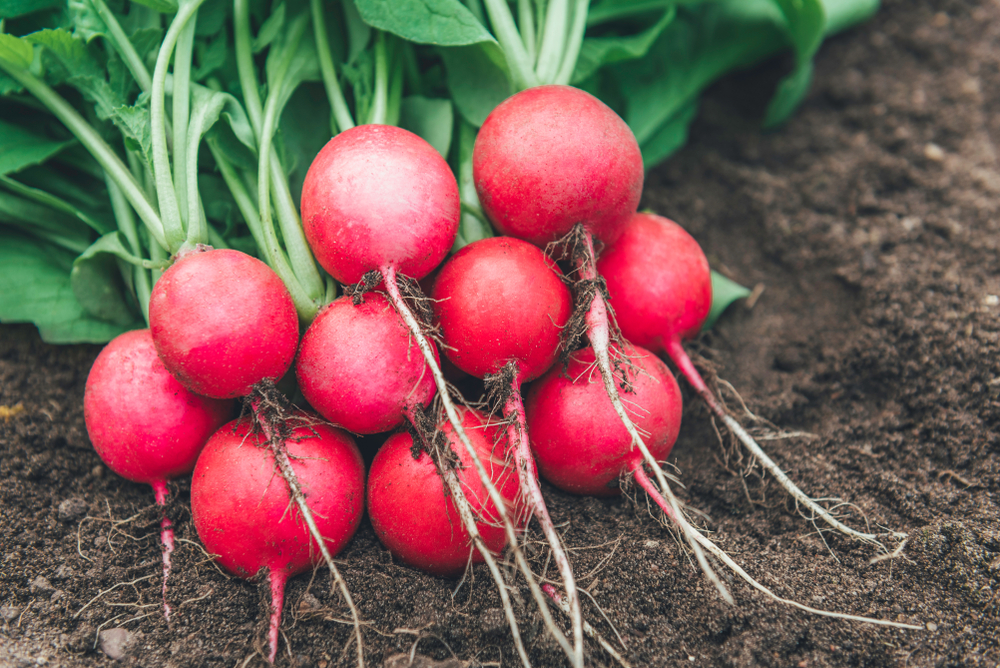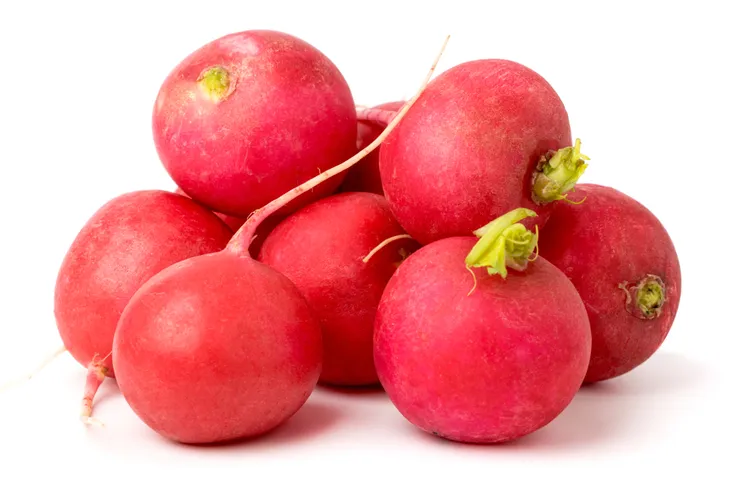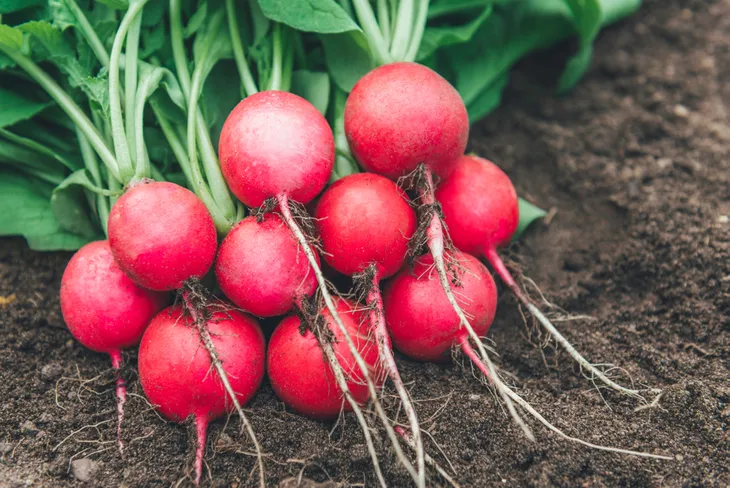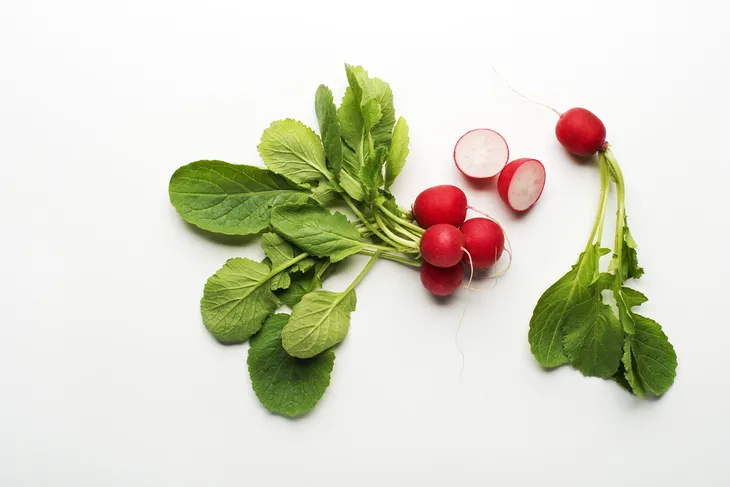Radishes are not an uncommon food, but they’re often overlooked because they’re rarely ever eaten on their own and often added to other dishes as a side or topping. But radishes can hold their own when it comes to health benefits!
As a member of the Brassicaceae family (which also includes mustard and cabbage), radishes contain lots of great vitamins and nutrients that contribute to our overall health. Plus there’s many different kinds of radishes to choose from, like cherry belle radishes (which are probably the most common), as well as french breakfast radishes, daikon (Chinese) radishes, black Spanish radishes, and Easter egg radishes which are all among the most common.
Here’s a look at 12 of the most incredible health benefits that can come from eating radishes on a more regular basis…
Good Source of Potassium
First up, potassium. Radishes contain potassium which has many great effects on the body, the best being that it works to lower our blood pressure which is especially important for people who suffer from hypertension. It also promotes good blood flow in the body. “This mineral supports proper fluid balance in the body by acting as a diuretic in opposition to sodium. The symptoms of a sodium/potassium imbalance include swollen ankles or fingers, extreme thirst and irregular heartbeat to name a few. A long-term fluid imbalance like this can contribute to high blood pressure,” writes Chatelaine.
Promote Good Digestion
Radishes promote healthy digestion because they are a high fiber food. As most people know, fiber is what is needed to keep us regular, help things move along, and prevent constipation at the same time. Healthline notes that only 1/2-cup of radishes will provide 1-gram of fiber. All you need to do is eat a few serves a day to get yourself to the daily recommended amount of fiber. There’s also evidence that fiber could help keep our blood sugar levels low, assist in weight loss, and lower cholesterol, says Healthline.
The source cites a study looking at the effects of radish juice on stomach ulcers. The findings “showed that radish juice may help prevent gastric ulcers by protecting gastric tissue and strengthening the mucosal barrier. The mucosal barrier helps protect your stomach and intestines unfriendly microorganisms and damaging toxins that may cause ulcers and inflammation,” writes Healthline.
Antifungal Properties
Radishes have natural antifungal properties which give them the ability to treat infections and common fungi. The reason for this is because they contain the antifungal protein RsAFP2, says Healthline. The source cites a study published in Molecular Microbiology which found that RsAFP2 “caused cell death in Candida albicans, a common fungus found in humans. When Candida albicans overgrowth, it may cause vaginal yeast infections, oral yeast infections (thrush), and invasive candidiasis.”
A separate study published in the American Society for Microbiology found that this protein was also effective in treating other Candida species. The source notes that while effective in others, RsAFP2 was found to not be effective in treating the Candida glabrata strains.
Help with Weight Loss
Most people are looking for an easy fix when it comes to losing weight, but unfortunately the only way to do so is to clean up eating habits and start exercising more regularly. There’s no magic cure. One way to help speed up the process or ensure success, is to start eating radishes. This veggie helps aid weight loss because it’s a high-fiber food which means it can “regulate bowel movements, eliminate constipation, which is a cause of hemorrhoids, and may lower cholesterol by binding to low-density lipoproteins,” writes Dr. Axe.
While it might seem odd to eat fiber-rich foods when trying to lose weight because they tend to make us feel more full, the point is to stop us from eating more than we need to. It works to suppress our appetite in a healthy way that avoids overeating which is a common mistake, explains Dr. Axe. They are also low in calories (1/2-cup amounts to about 12-calories) and high in water content. Not only that, but eating more fiber is a smart thing to do considering most adults are lacking the recommended amount of fiber in their diet.
May Protect Against Cancer
While there’s no magic cure for cancer, there are ways we can protect ourselves to lower our risk of developing certain cancers. A lot of that has to do with eating healthy, especially certain foods like radishes that contain isothiocyanates. The importance of this compound is that it can be effective against preventing some cancers. LiveStrong cites research published in the issue of planet Foods for Human Nutrition which was conducted at the Jawaharlal Nehru Technological University in India. The study tested parts of the radish against human cancer cells and found that “compounds in the radish bulb, or root, affect genetic pathways in the cancer cells, including cancer cell death.”
Another study performed at the Linus Pauling Institute found that cruciferous vegetables, like radishes, “contain compounds that are broken down into isothiocyanates when combined with water. Isothiocyanates help purge the body of cancer-causing substances and prevent tumor development,” writes Healthline.
In addition to that, the fiber content in radishes could help lower the risk of developing colon cancer, according to a report from the Harvard School of Public Health.
Good Source of Vitamin C
We usually think of oranges when we need some vitamin C, but there are actually many other foods that have higher levels of vitamin C, like radishes! According to Dr. Axe, 17.2-miligrams of radishes can give us nearly 30-percent of the daily recommended amount. That’s amazing! Vitamin C is a vital nutrient to our health for many reasons, but one of the major ones is that it helps make collagen which is what makes cartilage in our body. If we eat more vitamin C it will “help limit damage to cartilage that may be caused by free radicals found in the body,” writes Dr. Axe. This is great news for anyone who suffers from arthritis and it can help prevent the condition from happening in the first place.
It also helps to keep our immune system healthy. Eating radishes on a regular basis will give your body the best chance it has at protecting against the common cold and other viruses. In order to reap these benefits you have to consume radishes on a regular basis, not just once in a while. Lastly, vitamin C “works in the body to rebuild tissues, blood vessels and maintain bones and teeth,” says LiveStrong.
Good for the Heart
Taking care of our heart is important for obvious reasons and while eating healthy might not seem like it has anything to do with the heart, it does! Especially when we eat certain foods like radishes. They help prevent heart disease because they contain the flavonoid known as anthocyanins.
Dr. Axe refers to a recent study which found that anthocyanins have anti-inflammatory properties that work to reduce the risk of cardiovascular disease, artery disease, heart failure, and kidney disease. The way it works is that they “circulate metabolites, which are the ‘products of metabolic reactions catalyzed by various enzymes naturally occurring within cells. This process could be what provides protection against many heart issues, targeting the vascular system, by reducing oxidative stress and reducing inflammation.”
It Can Detox the Body
Eating radishes regularly is a great way to cleanse and detox the body, mainly the liver and stomach. Radishes help cleanse the blood by removing toxins and waste and can be beneficial to people who suffer from jaundice because eating radishes also “decreases the obliteration of red blood cells that happen to people suffering from jaundice by increasing the supply of new oxygen to the blood,” writes Natural Food Series. We often hear about jaundice in babies, but it can happen to adults too. You’ll know it’s happening when there is a yellowish discoloration to the skin and in the white of the eyes. If this happens, consult a doctor.
Dr. Axe says it could be due to “higher than normal levels of bilirubin in the blood, and thought it’s not a disease, it could be an indication of something more serious.” Luckily, radishes are able to remove bilirubin and stabilize production. When it comes to treating jaundice, choose black radishes and keep the green leaves! Dr. Axe advises not to use radishes on infants without consulting a doctor first.
Help Control Diabetes
Diabetes is a chronic disease that affects many, many people and can have a major impact on a person’s life. Luckily, there are some ways to help manage and control the effects of diabetes, one of which is to eat healthier. According to StyleCraze, one of the best foods for diabetics to eat is radishes. A study conducted at the University of Allahabad in India found that this vegetable can help diabetic patients because the “roots possess hypoglycaemic and anti-diabetic capabilities. Moreover, they have negligible or no side effects; radish also balances blood glucose levels,” writes the source.
Promote Skin Health
Radishes have a lot of great nutrients and vitamins including B vitamins, zinc, phosphorus, and as we’ve already mentioned, vitamin C. “Part of what makes the radish a good choice for the skin is the antibacterial properties that help heal dry, cracked skin and prevent infection,” says Dr. Axe. It also has lots of water so it hydrates the skin. NDTV Food recommends drinking radish juice every day in order to reap the most benefits for skin health. The same source notes that you could also make a radish paste which can be used to clean your face and be applied to your hair to treat dandruff, prevent hair loss, and strengthen the roots.
Another big promoter for healthy skin is the vitamin C content. According to Healthline, 1/2-cup of radishes amounts to 14-percent of the recommended daily serving. Vitamin C helps our skin heal. It also “battles free radicals in your body and helps prevent cell damage caused by aging, an unhealthy lifestyle, and environmental toxins,” writes Healthline.
Cure Piles
You might be wondering what piles are, well basically they’re just a fancy word for hemorrhoids. Radishes are a good source of fiber which makes them a good treatment for piles. People who suffer from piles should consider eating more radishes because they are mainly composed of indigestible carbohydrates and will settle those uncomfortable symptoms of piles. You can also try drinking radish juice which will “calm the digestive and excretory system, further relieving the symptoms of piles,” says Natural Food Series.
Good for the Liver
Radishes promote good health by encouraging liver and gallbladder functions which are responsible for the flow of bile, bilirubin, acids and enzymes. Natural Food Series explains that radishes “eliminate extra bilirubin from the blood, and it compass enzymes like myrosinase, diastase, amylase and esterase. Regular ingesting of radishes defends your liver and gallbladder from contagions and ulcers.”















